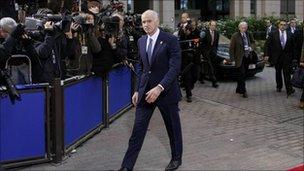Euro summit: Leaders locked in talks on debt crisis
- Published

Those who lent to PM George Papandreou's Greece could face another debt write-off
EU leaders are continuing an emergency summit in Brussels aimed at tackling the eurozone debt crisis.
After a first round of talks, the leaders said broad agreement had been reached on recapitalising banks exposed to countries that might default.
But other elements of a full package are still being debated.
There are fears the Greek debt crisis could spread to Italy and Spain. German Chancellor Angela Merkel said there remained "many problems to settle".
As she arrived in Brussels on Wednesday, she said: "The world is watching Germany and Europe. They are looking to see if we are ready and able to assume our responsibilities during Europe's worst crisis since the end of World War II."
But according to draft summit conclusions there are still plenty of details to pin down, the BBC's Chris Morris in Brussels reports.
Higher standards
The summit has been discussing a number of proposals reportedly agreed on by EU officials at the weekend, including:
European banks must raise 106bn euros (£92bn; $147bn) in new capital to shield them against possible losses to indebted countries
The European Financial Stability Facility (EFSF) - the single currency's 440bn-euro bailout fund - is to be given more firepower, although it is not clear how this will be achieved
Lenders to Greece will be asked to agree to much deeper losses than the 21% write-off currently on the table.
BBC economics correspondent Andrew Walker says tackling the weakness of banks is the area where most progress has been made.
A statement by EU leaders said banks should meet higher standards of financial strength but did not give a figure for how much extra they would have to raise.
It said the banks should try to raise the money privately - but if necessary, they would have to turn to public funds.
However key points of disagreement remain between the main eurozone powers.
France had hoped that the European Central Bank (ECB) would support the EFSF by providing it with loans that could increase the fund's total capacity to 2tn-3tn euros.
But this idea was blocked by Chancellor Merkel.
Instead, governments are expected to agree that the EFSF can help out troubled eurozone governments such as Italy and Spain by providing partial guarantees to investors and banks who lend them more money.
Stopgap
BBC business editor Robert Peston says the EU is left with using complicated financial engineering that may only boost the EFSF capacity to about 1tn euros.
He says the markets may be disappointed in this move, which may only buy a year or so - not enough time for fundamental reform of Europe's debt-ridden economies.
There was also disagreement over the extent of losses that should be imposed on Greece's lenders, with Germany seeking a 50%-60% haircut.
The ECB is said to be against such an increase in potential losses.
Mrs Merkel and French President Nicolas Sarkozy are now negotiating directly with private sector bankers on the Greek debt.
And difficulty about such details appear to have been behind a decision to cancel a meeting of EU finance ministers which was to have preceded the leaders' summit.
Before flying to Brussels, Chancellor Merkel won a vote in the German parliament giving her a mandate to strengthen the EFSF.
Angela Merkel says ''we have to fight'' to resolve Europe's issues
She told MPs it was worth taking the risk to maximise the fund's spending power in order to safeguard Germany's future prosperity.
French Prime Minister Francois Fillon said that if Wednesday's summit ended in failure, "this could tip the European continent into unknown territory".
Italian Prime Minister Silvio Berlusconi was expected to provide only promises of economic reforms in Italy, even though other eurozone leaders have demanded he bring concrete plans to Brussels of how the government intends to reduce its debt.
In a long day of talks with his Northern League coalition partner, an agreement was reached on the contentious issue of raising the retirement age to 67 by 2025.
The BBC's David Willey in Rome says there is little ground for optimism that the deal is going to satisfy either Italy's EU partners or international financial markets about the country's ability to repay its long-term debts.